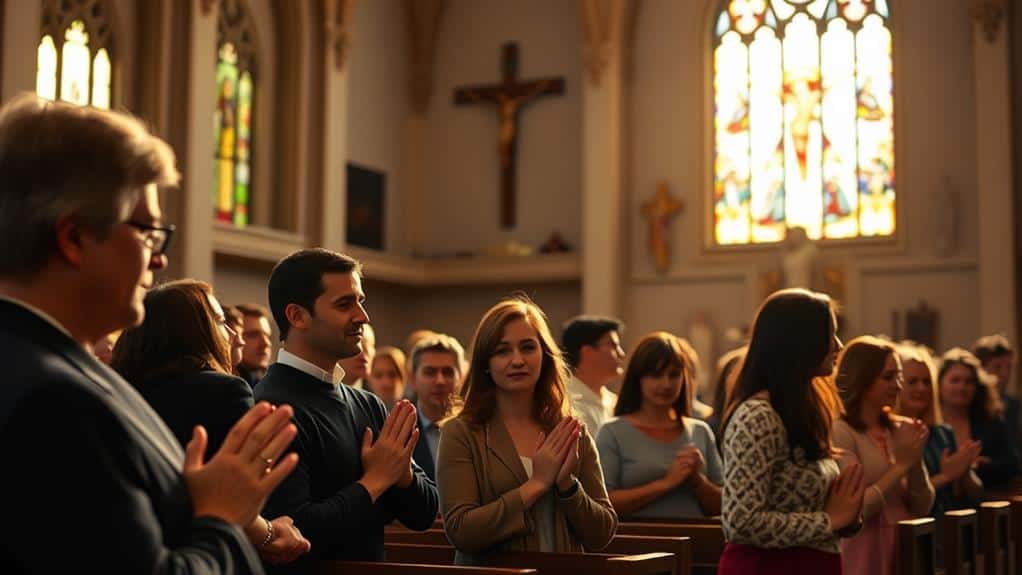The 15 judges who shaped Israel's destiny left a lasting impact on the nation's history, demonstrating the significance of spiritual leadership in times of crisis. These courageous leaders, including Jephthah, Samson, and Deborah, exhibited diverse leadership styles, emphasizing bravery, prophetic guidance, and faith-based decision-making. Their decisions led to periods of peace and prosperity, while disobedience resulted in turmoil, underscoring the consequences of actions. As their stories reveal, the judges' legacy continues to provide valuable lessons for contemporary believers, highlighting the importance of seeking divine guidance and the enduring power of faith, obedience, and resilience in the face of adversity, inviting further exploration of their remarkable journeys.
Key Takeaways
- Israel's judges played a crucial role in shaping the nation's destiny, leading them out of cycles of sin and oppression.
- The 15 judges demonstrated diverse leadership styles, showcasing bravery, prophetic guidance, and spiritual resilience during crises.
- Judges acted as spiritual guides, providing prophetic wisdom, accountability, and maintaining order and justice in ancient Israel.
- Their decisions led to periods of peace and prosperity, while disobedience resulted in cycles of turmoil, underscoring the consequences of actions.
- The judges' legacy emphasizes faith, obedience, and resilience, providing valuable lessons for contemporary believers and highlighting the importance of seeking divine guidance.
Israel's History and the Judges
As Israel's history unfolded, the judges played a pivotal role in shaping the nation's destiny, stepping in to lead the people out of cycles of sin and oppression.
The judges' influence extended beyond their leadership roles, as they helped shape Israelite identity through their faithfulness to God's commands.
Throughout the leadership cycles, judges demonstrated spiritual resilience in the face of crisis, providing faithful guidance to the people.
Charismatic leaders, chosen by God through divine callings, helped manage crises and foster national unity.
Within the historical context, the judges' role was essential in maintaining the nation's spiritual foundation.
Their legacy promotes resilience and faithfulness, underscoring the importance of obedience to God's commands.
Leadership Qualities of Judges
Seven key leadership qualities defined the judges of Israel, empowering them to navigate the nation's complexities and make significant decisions that would shape its destiny.
These charismatic leaders exhibited courageous faith, relying on divine guidance to inform their decisions and drive their actions. With resilience in the face of adversity, they emphasized obedience to God's commands and encouraged repentance during times of trouble.
Acting as spiritual connectors to God, the judges maintained worship and devotion among the Israelites, ensuring spiritual continuity. Their courageous faith and reliance on divine guidance enabled them to provide strategic leadership during crises, making a lasting impact on Israel's history.
These leadership qualities played a vital role in shaping the nation's identity and faith.
Impact on Israel's Destiny
How did the judges' leadership shape the course of Israel's history? Their decisions led to periods of peace and prosperity, while disobedience resulted in cycles of turmoil. The judges' actions underscored the consequences of obedience and influenced future generations, shaping Israel's national identity and faith.
- The judges' leadership legacy was marked by:
- Cycles of deliverance, where God intervened to rescue Israel from oppression
- Spiritual continuity, as the judges maintained worship and devotion among the Israelites
- Crisis management, as they provided strategic leadership during times of turmoil, often reflecting divine intervention
The judges' impact on Israel's destiny was profound, with their faithfulness themes and leadership legacy continuing to inspire future generations.
Their decisions had a lasting historical impact, influencing the course of Israel's history and shaping the nation's identity.
Divine Providence in Leadership
Stepping into the intricacies of Israel's leadership, divine providence takes center stage, weaving a narrative of God's unfolding plan for His people. Throughout Israel's history, divine guidance played a pivotal role in shaping the nation's destiny.
Leadership examples, such as the judges, demonstrated faithful obedience to God's commands, even in the face of crisis. Their crisis management was characterized by spiritual resilience, underscoring the importance of trust in God's sovereignty.
Within the historical context of Israel's development, leadership dynamics were influenced by providence manifestation. The judges' faithful stewardship was a reflection of God's sovereign selection.
As Israel navigated periods of turmoil and peace, the judges' commitment to divine guidance remained steadfast, illustrating the enduring impact of divine providence in leadership.
Overview of the 15 Judges
As the concept of divine providence in leadership sets the stage for understanding Israel's history, it becomes evident that the judges chosen by God played a pivotal role in shaping the nation's destiny.
The 15 judges, each with unique qualities and strengths, exercised Judicial Authority in guiding Israel through periods of turmoil and peace. Their Leadership Dynamics were instrumental in shaping the nation's faith and identity.
- Diverse Leadership: Othniel, Ehud, and Shamgar demonstrated bravery and cunning, while Deborah, Gideon, and Samuel exemplified prophetic guidance and spiritual leadership.
- Challenges and Triumphs: Jephthah's tragic vow and Samson's struggles with temptation highlight the complexities of leadership, while Tola, Jair, Ibzan, Elon, and Abdon's quiet service emphasizes the value of humility and faithfulness.
- Legacy: The judges' impact on Israel's destiny underscores the importance of faith, obedience, and resilience in leadership, leaving a lasting legacy for future generations.
Stories and Lessons From Judges
Throughout Israel's history, the judges' stories have served as a rich fabric of lessons, woven from the threads of faith, obedience, and resilience.
The judges' influence extends beyond their individual stories, as they collectively demonstrate the importance of spiritual resilience in the face of adversity. Their experiences serve as a reflection of the power of faith and obedience, as they navigated the complexities of leadership and made decisions that shaped Israel's destiny.
From Othniel's precedent-setting leadership to Samson's struggles with temptation, each judge's story offers valuable insights into the human condition.
Role of Spiritual Leadership
Spiritual leadership played a pivotal role in the lives of the judges, as they acted as spiritual guides for the Israelites. Their role was essential in providing spiritual guidance, promoting covenant faithfulness, and demonstrating leadership accountability.
Some key aspects of their spiritual leadership include:
- Spiritual Guidance: Judges like Deborah and Samuel provided prophetic wisdom, guiding the Israelites in times of uncertainty.
- Covenant Faithfulness: Judges such as Gideon and Ehud demonstrated faithfulness to God's covenant, inspiring community resilience and moral integrity.
- Divine Intervention: Judges like Samson experienced divine intervention, illustrating the importance of faith-based decisions in leadership.
Challenges Faced by Judges
Numerous challenges confronted the judges of Israel as they navigated their multifaceted roles as spiritual leaders, military commanders, and dispute resolvers.
The judges' struggles were compounded by leadership challenges, including the need to maintain tribal unity and fend off external threats from neighboring nations.
Spiritual warfare was another significant challenge, as judges battled against idolatry and encouraged faithfulness to God.
Faith crises and moral dilemmas frequently arose, testing the judges' wisdom and integrity.
Community conflicts also required resolution, demanding the judges' diplomacy and fairness.
Through it all, the judges sought to uphold God's law and promote justice, their responses to these challenges shaping Israel's destiny and leaving a lasting impact on the nation's spiritual and social landscape.
Lessons for Contemporary Believers
Nine timeless principles from the lives of the judges offer valuable lessons for contemporary believers. The judges' experiences serve as a reminder of the importance of faithful obedience and leadership resilience.
By studying their stories, individuals can gain insight into how to navigate challenging situations and make informed decisions. Key takeaways from the judges' lives include:
- The value of seeking divine guidance in decision-making, as seen in Gideon's fleece-testing experience.
- The importance of resilience in the face of adversity, exemplified by Deborah's military leadership.
- The need for faithful obedience, demonstrated by the consequences of Israel's disobedience during the judges' era.
These lessons remain relevant today, offering guidance for believers seeking to deepen their faith and make a positive impact in their communities.
Spiritual Superstars and Game-Changers
The judges of ancient Israel left an indelible mark on the nation's history, proving themselves to be both spiritual stalwarts and agents of change.
As spiritual superstars, they maintained order and justice in society, settled disputes, and promoted social harmony. Their leadership unified the tribes and helped them navigate the complexities of the covenant with God.
By embodying spiritual resilience, the judges demonstrated an unwavering commitment to their faith, even in the face of adversity. Through transformative leadership, they guided the Israelites toward a deeper understanding of their relationship with God.
The judges' legacy continues to inspire and influence contemporary believers, offering timeless lessons on faith, leadership, and the importance of spiritual guidance in times of turmoil.
Period of Judges and Influence
Building on the spiritual foundation laid by these leaders, Israel's period of judges was marked by cycles of disobedience and deliverance, as the nation struggled to maintain its faithfulness to God's covenant.
This era saw the rise of charismatic leaders who exercised judicial authority, guiding the Israelites through periods of turmoil and oppression.
Cyclical leadership characterized this period, with judges emerging to address specific crises and then relinquishing power.
- The judges' leadership was marked by a mix of military victories and spiritual guidance, as they sought to restore the nation's faithfulness to God's covenant.
- Their judicial authority was often exercised in response to external threats, such as the Philistines and Canaanites.
- Despite the challenges, the judges played a significant role in shaping Israel's national identity and faith, laying the groundwork for the monarchy that would follow.
Common Questions About Judges
As people explore the period of judges in Israel's history, many questions naturally arise about the role and significance of these leaders. The judges' influence on Israel's destiny is multifaceted, with their leadership styles shaping the nation's spiritual journey.
Some may wonder how judges were chosen or what qualities made them effective leaders. Others might ask about the differences between judges and kings or how judges addressed the internal struggles of the Israelites.
These questions highlight the complexities of the judges' roles, which went beyond mere military victories to include spiritual guidance and faithfulness to God. By examining these questions, one can gain a deeper understanding of the judges' influence and the significance of their leadership styles in shaping Israel's history.
Quiet Watchmen of Israel
Not all judges in Israel's history garnered widespread recognition for their military prowess or monumental decisions. Tola, Jair, Ibzan, Elon, and Abdon, however, demonstrated quiet influence and humble leadership, leaving an enduring legacy despite their overlooked contributions.
Their faithful service exemplified silent strength, maintaining stable governance during turbulent times.
- Resilient watchmen: They provided steadfast dedication to the Israelites, weathering internal and external challenges.
- Uncelebrated heroes: Without seeking to draw attention to themselves, they led with integrity and wisdom.
- Legacy of quiet service: Their selfless leadership serves as a reminder that lasting change doesn't require fame or recognition, only a commitment to serving others.
These quiet watchmen played an essential role in shaping Israel's destiny, leaving behind a testament to the power of humble, faithful leadership.
Jephthah's Tragic Vow and Lesson
One of the most poignant examples of a hastily made vow in the Bible is Jephthah's promise to sacrifice the first thing that came out of his house to meet him if God granted him victory over the Ammonites.
This vow ultimately led to the tragic sacrifice of his own daughter, underscoring the importance of considering the consequences of one's promises. Jephthah's legacy serves as a cautionary tale about leadership pitfalls and the devastating implications of desperation decisions.
The intersection of honor and tragedy in Jephthah's story highlights the complexities of faith and folly. In addition, it emphasizes the importance of understanding the covenant with God and the gravity of sacrifices made in its name.
Jephthah's vow has lasting implications for leaders and followers alike.
Samson's Strength and Redemption
With incredible feats of physical prowess, Samson's life was marked by a complex interplay of strength and weakness.
Despite being set apart by God, he struggled with moral failings and worldly allure, exemplified in his tumultuous relationship with Delilah.
- His incredible strength allowed him to single-handedly defeat the Philistines and perform impressive feats, yet this strength was also a curse, as it often fueled his pride and hubris.
- His association with Delilah ultimately led to his downfall, as she betrayed him, resulting in his capture and physical disfigurement.
- Yet, through divine intervention and Samson's own willingness, he commenced on a journey of redemption, as God restored his strength one last time, allowing him to destroy his Philistine captors and rediscover his purpose.
Frequently Asked Questions
What Motivated the Judges to Assume Leadership Roles in Ancient Israel?
God empowered charismatic leaders, the judges, to guide Israel during crises, driven by their faith and obedience. They tackled leadership challenges, relying on divine guidance to make decisions and promote resilience among the Israelites.
How Did the Judges Balance Divine Guidance With Personal Decision-Making?
The judges balanced divine guidance with personal decision-making by seeking divine inspiration and then acting on faith, often steering through personal conflict and doubt to make decisions that aligned with God's will for the Israelites.
Were the Judges Formally Trained or Appointed to Their Positions?
The judges weren't formally trained or appointed to their positions; instead, they were chosen by God and rose to judicial authority within their historical context, often unexpectedly, to guide the Israelites during tumultuous times.
What Role Did the Judges Play in Shaping Israel's Worship Practices?
They played a significant role in shaping Israel's worship practices, influencing worship evolution by establishing ritual significance and emphasizing the importance of obeying God's commands, thereby ensuring spiritual continuity and fostering a deeper connection with God.
How Did the Judges' Legacies Influence the Development of Israel's Monarchy?
The judges' legacies considerably influenced the development of Israel's monarchy by establishing a foundation for judicial authority and facilitating a smooth leadership change from a tribal confederation to a unified kingdom under a single ruler.
Conclusion
Israel's judges played a pivotal role in shaping the nation's destiny, exemplifying faithfulness, obedience, and divine guidance. Through their diverse stories, they offer timeless lessons on leadership, faith, and redemption. As quiet watchmen, they reminded Israel of God's providence, instilling trust and resilience. Their legacy continues to inspire contemporary believers, underscoring the significance of trust, strength, and redemption. The judges' impact on Israel's identity and faith remains profound, a demonstration of God's enduring power.






